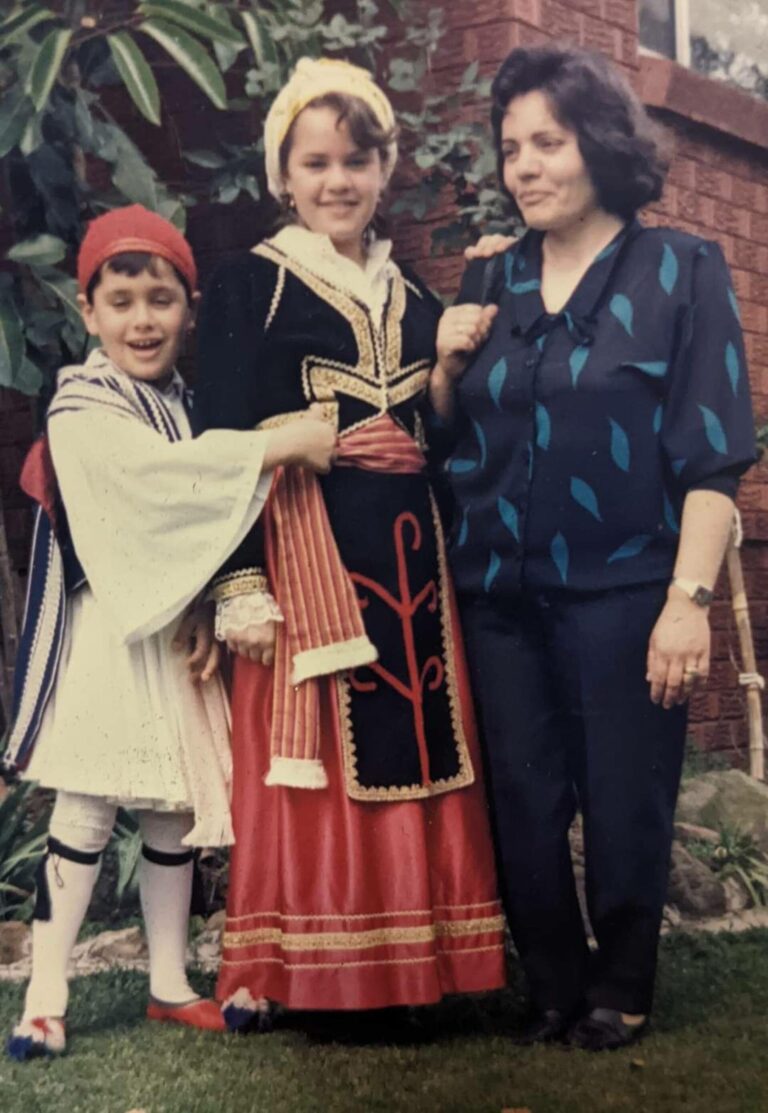Award winning author Peter Polites, who has written the acclaimed Down The Hume and The Pillars, is back with a third novel, but this time it’s for the family.
God Forgets About the Poor is a love story to his migrant mother, a story that was important for Polites to tell.
The title comes from a quote by his mother.
“Start when I was born. Describe the village and how beautiful it was. On the side of a mountain but in the middle of a forest,” his mother tells him.
“If we walked to a certain point on the edge, we could look over the valley and see rain clouds coming. Sometimes we would see a cat on a roof, we read that as a warning of a storm. When we looked down, we saw the dirt, which was just as rich as the sky. My island, your island, our island.
“Sometimes I think God forgot about us because we were poor.”
The novel tells Polites’ mother’s life story from her village on the island of Lefkada during World War II, followed by the bloody fratricide of the Greek Civil War, and the year she spent in hospital, at the age of four following an illness that left one leg deformed, and follows her as an adult to Athens, with no family, as the Colonels’ Junta took control in 1967. Conflict was prevalent in her life and followed her to Australia.
She was one of five sisters, born into a society that valued boys and when asked, her mother would say: “no children, only daughters”.
Polites tells Neos Kosmos why he wanted to tell her story, and shares an insight into a common stereotype.
“I think everyone has a story to tell and I think a lot of the times we don’t know how to tell that story,’ he said.
“What really inspired me to write it was really the idea that we haven’t seen the stories of a certain generation of Greek migrant women.
“Those Greek women are seen as a joke, as a punchline. I think those women have very interesting experiences and stories.
“There’s the joke about elderly Greek women that they’re always offering food, and ‘eat, eat eat’… but that comes from the fact that they were raised in, and grew up, during the famine.
“Not many people talk about why they offer food and why food is such a value system or a cultural product. It’s because of the fact that they starved. So, I wanted to correct the representations of those women.”
During his research for the book, Polites looked at Greek academics across England and Europe who were studying the famine foods of the Greeks, and came to a realisation about the Greek Australian community.
“What I found interesting was the difference between what they ate during the famine wasn’t that different to what we ate in Australia growing up.”
“I’m talking about horta (greens), fakes (lentils), psomi (bread), revithada (chickpeas), the Greek staples.
“The fact that we’re such a plentiful country but we’re still eating those subsistence-based diets that are actually much healthier than what most people are eating anyway.”

This realisation is evidence of cultural jet lag that we Greek Australians live with. When Greeks came to Australia, they brought their customs and culture with them, and as time has moved on, and the generations change, these customs have been passed down. In Greece, times have changed, but in Australia, while there is obviously change, lots of old traditions remain.
“We starved for food in Greece and starved for Greece in Australia,” Polites’ mother says, and that is very well true, now living in a nation that has an abundance of food, but still starved for that Greek famine food.
“You don’t know the first thing about me. A son can never see his mother as a woman. You will only see me in relation to you. I have had a thousand lives before you were even a thought.”
This writing experience saw Polites learn more about his mother and grandmother through his aunty and cousins, and a major realisation was that his mother was a fully formed person before she even thought about having him, and that he wasn’t the cause of his parents’ problems.
“A lot of the Greek families are pretty dysfunctional, right?” Polites asks.
“I’m happy to say that my family has a level of dysfunction like we all do, and I’m happy to say that I learned that my family started long before I was even born.
That’s a very interesting thing to think about when you think you’re the cause of everyone’s problems, as you do when you’re a teenager. And I think some men and some women never grow out of that.
“They never see their parents as separate entities that had different hopes and dreams for themselves.”
The closing chapters of God Forgets About the Poor come in from the perspective of Polites and his sister. Changing things up but not straying from the original story.
The main character has some sharp jabs for her children, who she is ultimately proud of. Something many readers can relate to.
For Peter, she says he was a “peaceful baby… never crying. Slept on time and ate” saying to herself “Oh my! This is why the Greeks love boys!’ But then you ended up gay.”
His sister is spared: “Your sister … Now she’s a big lawyer, and won a case in the High Court in Canberra. But look around at the mess. Will the High Court do the vacuuming?”
Polites says it was important for their perspective to be featured because children are an extension of their parents.
“Family was such a determined value system for so much of the Greek community, I don’t see a separation that much between mother and children. I just think we’re part of, in some way, one organism.”
“What I love about traditional Greeks is that they don’t see themselves as separate from the family unit. So, if someone does something bad in the family, then that reflects on the family. Someone does something good that reflects on the family, and that’s good and bad in different ways.”
Polites brings to light his mother’s story, a migrant woman who has lived a number of lives, surely a common story in the Greek community, and while the title suggests god may forget about the poor, Polites wants to make sure the world does not.








